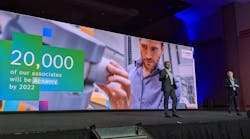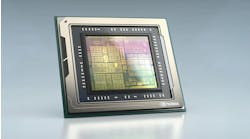Artificial intelligence in transportation is ‘not science fiction anymore’
LAS VEGAS — The road to autonomous driving is being driven by artificial intelligence.
“Artificial intelligence is not science fiction anymore — it’s already an integral part of our daily lives,” Michael Bolle, Bosch’s chief technical and chief digital officer, said Monday. “It’s fundamentally changing how we drive, how we work, how we learn, how we shop, how we travel.”
During the CES 2020 media day, two transportation technology companies, Bosch and ZF, teased the potential of commercial vehicle automation powered by AI. CES, the city-wide, international consumer technology convention began here officially on Jan. 7.
With a heavy focus on how AI will affect consumer vehicles — at an event that was formerly known as the Consumer Electronics Show — the commercial vehicle and business benefits of AI were teased by both firms. Bosch is promoting the value of AI in automation — including commercial and passenger vehicles. As is ZF, which recently acquired WABCO and has plans to make commercial vehicle automation a reality this decade.
Based on the ZF ProAI supercomputer, ZF is developing the Electronic Control Unit (ECU) for a Level 4 automated driving system for an international commercial vehicle manufacturer, which the company first teased at the North American Commercial Vehicle show in Atlanta last fall.
ZF CEO Wolf-Henning Scheider declined to name the OEM his company is working with — but he noted that the U.S. and China are two prime countries for self-driving commercial vehicles.
“The advantages that we find in the U.S. and also in China are some less crowded areas and highways that we don't have in other areas of the world,” Scheider said. “So it's favorable conditions here. So that’s probably why we’ll see it first in these markets.”
While the use of fully automated passenger cars still depends on regulations, commercial vehicles can already operate in highly automated modes within closed areas or defined lanes. In addition, Scheider noted that driverless transport at depots or in urban passenger transport offers potential savings that could lead to rapid adoption.
"In the case of commercial vehicles, we are already seeing strong demand for systems that make fully automated driving to Level 4 and higher possible," Scheider said.
ZF and the unnamed truckmaker plan to bring the new automated vehicle to market in the middle of the decade, he said.
The future of automation has led to questions about the future jobs of truck drivers. Bosch contends that artificial intelligence will create more jobs than it will kill.
AI is expected to substantially boost GDP in major world economies; PWC anticipates a 15% boost in North America. More than a year ago, the World Economic Forum predicted global job losses from AI would be offset by the new jobs created, leading to a net gain of 58 million new jobs by 2022.
And AI-powered machines will still need humans.
“Going forward, it will be essential that people remain in control of systems that use AI,” said Mike Mansuetti, president of Bosch in North America. “Take the example of driver assistance: here, we want to integrate AI in such a way that it can always be overridden by the driver. We don’t want to lock the algorithms from our AI models in a little black box. The rules and parameters behind decisions must remain comprehensible, at the very least for specialists.”
Bolle said that Bosch’s approach to AI differs from “big tech players.” The company is investing more than $110 million in an AI campus, it announced this week, which will be home to 700 AI experts from Bosch as well as from external startups and research groups. It plans to train 20,000 Bosch employees to be “AI-savvy” over the next two years.
“Whether it’s deployed in an automotive emergency braking system or in factory production, our AI explains the physical world to machines,” he said. “Our latest camera for automated driving uses AI to understand what it sees – to infer, say, whether a pedestrian is going to step out into the road or not. This will improve object recognition and make automatic emergency braking more reliable, thereby increasing safety.”
Sales of Bosch’s driver assistance systems rose by 12% to around $2.2 billion in 2019. And those system offerings are poised to grow this decade.
Bosch is now working on making lidar sensors production-ready as well. The lidar works with radar and cameras as the third sensor technology on automated vehicles. The Bosch long-range lidar sensor can also detect non-metallic objects at a great distance, such as rocks on the road, according to a news release.
On the opening day of the CES exhibit halls, Bosch plans to show off its new AI-powered Virtual Visor, a digital sun visor. A transparent LCD display connected to the interior monitoring camera detects the position of the driver’s eyes. The Virtual Visor analyzes this information and darkens only the portion of the visor through which the sun would dazzle the driver. The Virtual Visor won a CES Best of Innovation Award this year.
The company has developed a new interior monitoring system for passenger vehicles that can detect when the driver is drowsy or looking at a phone, for example. It monitors eyelid movements, direction of gaze and head position — and alerts the driver in unsafe situations.
In the future, when vehicles are in partially automated driving mode, such as on the freeway, the driver monitoring system ensures the driver can safely take the wheel again at any time.





